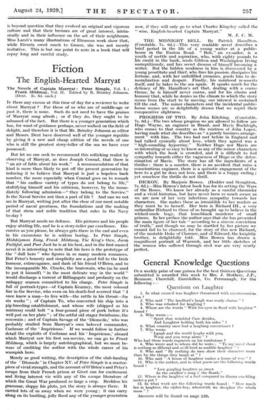F • •
iction
The English-Hearted Marryat
The Novels of Captain Marryat : Peter Simple, Vol. I.: Frank Mildmay, Vol. II. Edited by R. Brimley Johnson.
(Dent. 3s. 6d. each.)
Is there any excuse at this time of day for a reviewer to write about Marryat ? For those of us who are of middle-age or past it, there is none. Such do not need to have the praises of Marryat sung afresh ; or if they do, they ought to be ashamed of the fact. But there is a younger generation which has, for want of guidance perhaps, never walked on the field of delight, and therefore it is that Mr. Brimley Johnson as editor and Messrs. Dent have deserved well of the younger republic by giving it a new and cheap edition of the novels of one who is still the greatest story-teller of the sea we have ever possessed.
But let no one seek to recommend this rollicking realist by observing of Marryat, as does Joseph Conrad, that there is "an air of fable about his work." A recommendation of that kind is more than likely to put off the present generation by inducing it to believe that Marryat is just a hopeless back number, the more especially when Conrad goes on to remark that "his endless variety of types do not belong to life," stultifying himself and his criticism, however, by the imme- diately following admission—" they belong to the Service." Is the Naval Service not then a part of life ? And can we not see in Marryat, writing just after the close of our most notable period of naval greatness, the foundations and the making of that stem and noble tradition that rules in the Navy to-day?
But Marryat needs no defence. His pictures and his people enjoy abiding life, and he is a story-teller par excellence. Dis- cursive as you please, he always gets there in the end and even in his excursions he is seldom boring. In Peter Simple, Midshipman Easy, Frank Mildmay, The King's Own, Jacob Faithful, and Poor Jack he is at his best, and in the first-named novel it is interesting to note that his hero is the prototype of the "dull hero" who figures in so many modern romances. But Peter's honesty and simplicity are a good foil to the Irish humour, extravagance, and dash of his friend O'Brien, and to the incomparable Mr. Chucks, the boatswain, who (as he used to put it himself) "in the most delicate way in the world" would discharge a torrent of Billingsgate and profanity on the unhappy seamen committed to his charge. Peter Simple is full of portrait-types—of Captain Kearney, the most colossal liar in the Service, who even on his death-bed averred that "I once knew a man—to live with—the rattle in his throat—for six weeks " ; of Captain To, who converted his ship into a pig-breeding establishment, and whose wife (shipped as his mistress) could bolt "a four-pound piece of pork before it's well put on her plate " ; of the artful old stager Swinburne, the coxswain ; and of Captain Savage of the 'Diomede,' who was probably studied from Marryat's own beloved commander, 'Cochrane of the Imperieuse.' If we would follow in further detail the exploits of Cochrane and his Imperieuse,' aboard which Marryat saw his first sea-service, we can go to Frank Mildmay, which is largely autobiographical, but we must be- ware of crediting the author with the whole career of his scampish hero.
Merely as good writing, the description of the club-hal:lino, of the 'Diomede' in Chapter XV. of Peter Simple is a master- piece of vivid strength, and the account of O'Brien's and Peter's escape from their French prison at Givet can for excitement and living interest vie with any of the escape literature of which the Great War produced so large a crop. Reckless his grammar, sloppy his plots, yet the story is always there. It carried lots of us away when we were young ; it can carry along on its bustling, jolly -flood any of the younger generation now, if they will only go to what Charles Kingsley called the "wise, English-hearted Captain Marryat."
M. J. C. M.






























 Previous page
Previous page